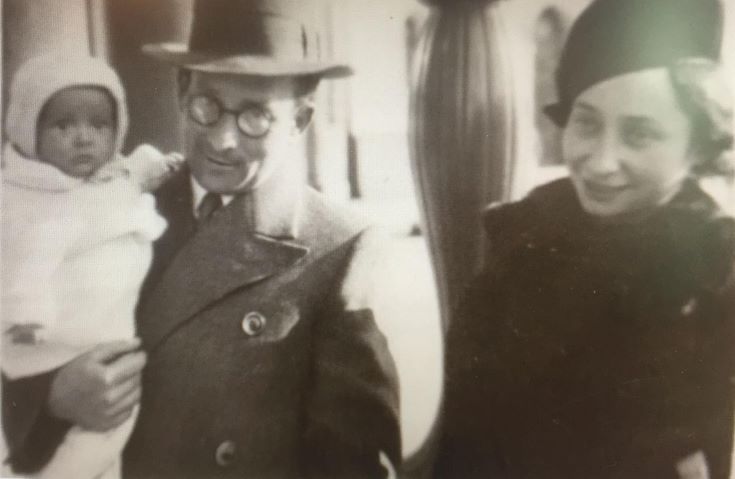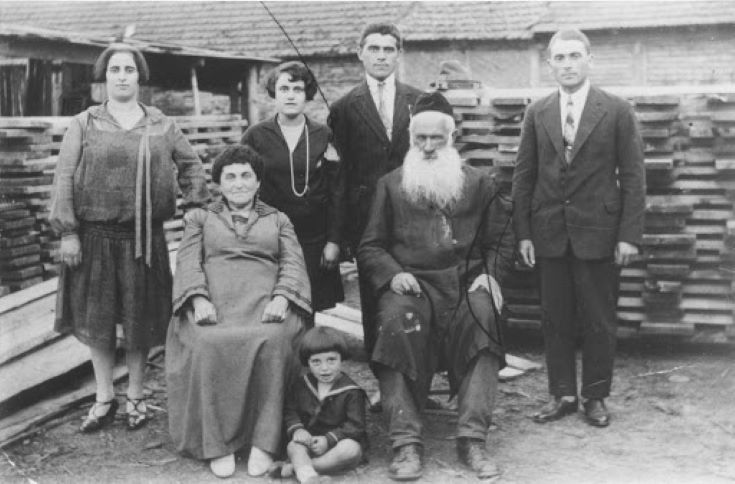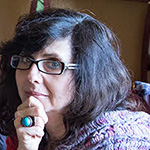Part 4: Courageous Rescues, Difficult Reunions: Heartbreaking Decisions by Parents during the Holocaust
June 23, 2021
By Joanna Beata Michlic
Editor’s Note: This blog comes from a lecture delivered at the International Seminar, Holocaust Education in the 21st Century: International Perspective, in recognition of the 25th of Yad Layeled, Ghetto Fighters’ House Museum, May 2, 2021. It is serialized in four parts.
Mira (Mirka) Monet
 In similar fashion to the Bickels family described in Part 3, Jack Skovronsky, the son of Eliyahu Skovronsky (Skowroński), today hopes to recover traces of the whereabouts of Mira (Mirka) Monet born in 1938. Before the outbreak of the Second World War, Mira's parents David Monet, born Oct. 14, 1910, and Mindla Monet, born in 1906 (or 1908?) née Skowrońska, lived at no. 26 Nowomiejska Street in the central neighborhood of the prewar multicultural and multi-ethnic city of Łódź. Most likely Mira was born there.
In similar fashion to the Bickels family described in Part 3, Jack Skovronsky, the son of Eliyahu Skovronsky (Skowroński), today hopes to recover traces of the whereabouts of Mira (Mirka) Monet born in 1938. Before the outbreak of the Second World War, Mira's parents David Monet, born Oct. 14, 1910, and Mindla Monet, born in 1906 (or 1908?) née Skowrońska, lived at no. 26 Nowomiejska Street in the central neighborhood of the prewar multicultural and multi-ethnic city of Łódź. Most likely Mira was born there.
What we know about Mira's wartime fate is based on sketchy evidence — mostly memories of Mira's youngest maternal uncle, Eliyahu Skovronsky, born July 14, 1920.
According to Eliyahu Skovronsky, in the summer of 1942, he was in charge of hiding Mira in a brick factory in Prądnik Czerwony, a northern neighborhood of Cracow, where he worked. However, someone denounced them and Eliyahu had to send Mira away to his cousins, the families of Rakowski and Banach in a small town Kazimierza Wielka, 45 kilometers northeast from Cracow. The Rakowski and Banach families owned a lumberyard factory in Kazimierza Wielka.
At their home, Mira was reunited with her mother Mindla, but their reunion did not last long. On Oct. 8, 1942, the Germans began a mass murder of the local Jewish community. The liquidation of the ghetto in Kazimierza Wielka lasted more than one month, and only 22 local Jews survived the daily killings. Most likely, in the midst of everyday terror, between the different actions, Mira was smuggled out of the ghetto and placed with a local Polish Christian family. According to Eliyahu, he had contacts with local Christian Poles and arranged a hiding place for Mira. It is possible that one of the headmasters of the two local middle schools, gymnasia, hid Mira in his home, and might have adopted her in the aftermath of the war. But the headmaster in question and any other witnesses have not yet been located. Both Mira's parents perished separately during the Holocaust.

The uncle Eliyahu survived and searched for his niece immediately after the war. However, he did not encounter any traces of Mira's whereabouts then and left Poland permanently. Nevertheless, he did not give up and continued to search for Mira in the 1960s. On Jan. 25, 1965, from his home in the U.S., he wrote an emotional letter to the Jewish Community in Cracow asking for assistance in his search for his niece. Eliyahu passed away in 1971. Today, a Polish woman Katarzyna Szuszkiewicz of the Anti-Schemes Foundation in Cracow with the assistance of a local historian Tadeusz Kozioł, is trying to help his son, Jack Skovronsky in a hope against hope search for Mira. Mira today, if she is alive, is an 83-year-old woman who might know or might not be aware of her painful past and her family’s origins. Like Alexander Bickels, Mira Monet belongs to a group of missing child Holocaust survivors from Poland.
 Joanna Beata Michlic is a social and cultural historian, and founder, and former director of HBI's Legacy Project: The Project on Families, Children and the Holocaust at Brandeis University. She is an Honorary Senior Research Associate at the University College London's (UCL) Centre for the Study of Collective Violence, the Holocaust and Genocide, UCL Institute for Advanced Studies, and Research Fellow at Weiss-Livnat International Centre for Holocaust Research and Education, University of Haifa, June 2019-May 2022. She is also a research associate at HBI, and a co-editor in Chief of Genealogy Journal. Her research focuses on social and cultural history of Poland and East European Jews, the Holocaust and its memory in Europe, East European Jewish childhood, rescue and rescuers of Jews in East-Central Europe, and antisemitism, racism, and nationalism in Europe. She is a recipient of many prestigious academic awards and fellowships, most recently Gerda Henkel Fellowship, 2017-21.
Joanna Beata Michlic is a social and cultural historian, and founder, and former director of HBI's Legacy Project: The Project on Families, Children and the Holocaust at Brandeis University. She is an Honorary Senior Research Associate at the University College London's (UCL) Centre for the Study of Collective Violence, the Holocaust and Genocide, UCL Institute for Advanced Studies, and Research Fellow at Weiss-Livnat International Centre for Holocaust Research and Education, University of Haifa, June 2019-May 2022. She is also a research associate at HBI, and a co-editor in Chief of Genealogy Journal. Her research focuses on social and cultural history of Poland and East European Jews, the Holocaust and its memory in Europe, East European Jewish childhood, rescue and rescuers of Jews in East-Central Europe, and antisemitism, racism, and nationalism in Europe. She is a recipient of many prestigious academic awards and fellowships, most recently Gerda Henkel Fellowship, 2017-21.
The author of this essay would be grateful for any potential information about the whereabouts of the child Holocaust survivors Mira Monet and Alexander Bickels. Please write to j.michlic@ucl.ac.uk